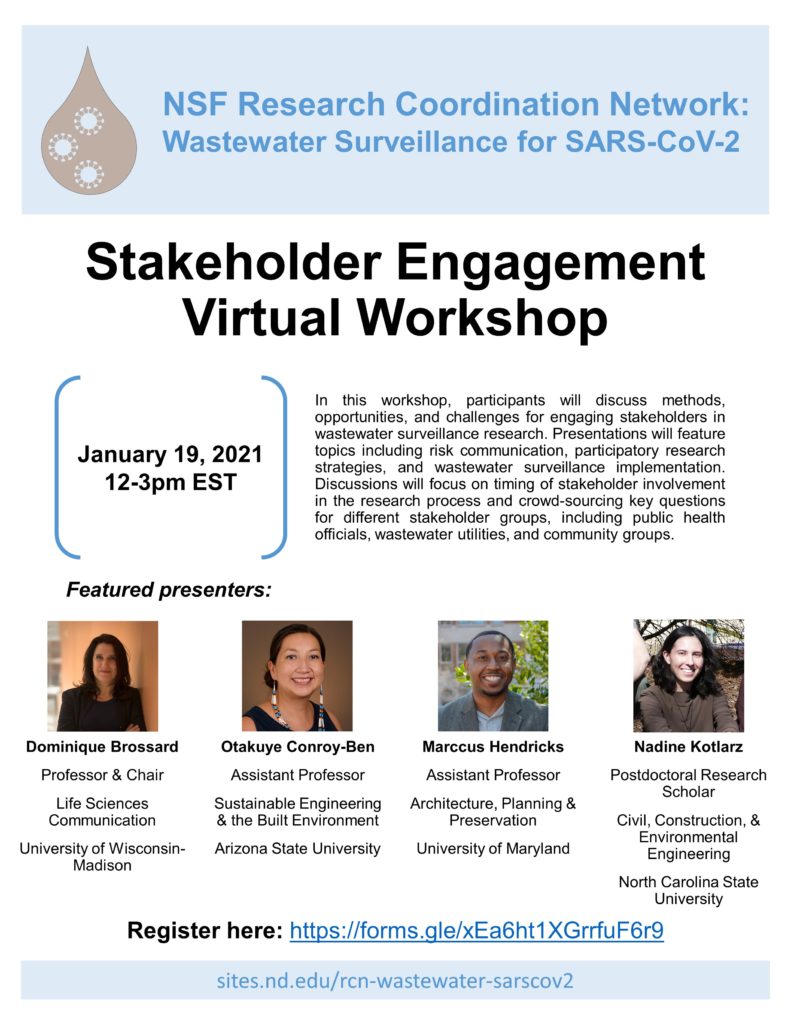January 19, 2021
The RCN on Wastewater Surveillance for SARS-CoV-2 held a public workshop to engage in discussion on stakeholder engagement in wastewater surveillance research. Here we summarize outcomes from the presentation and discussion sessions that were held. The 3-hour workshop on January 19th included participants from more than 10 states and 2 countries. We hope that our research community will employ new and successful stakeholder strategies based on content shared in this workshop and continue discussions surrounding the questions posed and topics presented, listed for reference below.
Workshop Sessions
The workshop consisted of two presentation sessions and two discussion sessions:
- Presentation Session 1: Introduction to stakeholder engagement, participatory research, and communications challenges
- Dominique Brossard, UW-Madison
- Marccus Hendricks, UMD
- Discussion Session 1: Stakeholder involvement timelines
- Presentation Session 2: Working with stakeholders in wastewater surveillance & wastewater-based epidemiology
- Nadine Kotlarz, NCSU
- Otakuye Conroy-Ben, ASU
- Discussion Session 2: Stakeholder action plans
Workshop Outcomes
Each session included both questions and suggestions on how to engage stakeholders more effectively and beneficially in our research projects. Here, we outline two of the major themes that were raised by workshop participants and presenters and highlight topics that require further discussion and investigation.
- Engagement works best when stakeholders are integrated into the research on Day 0.
In nearly every case, when participants discussed their current wastewater surveillance research and the ways in which stakeholders became involved, workshop participants expressed that they would have liked to engage these stakeholders earlier. Engagement of these stakeholders for the current SARS-CoV-2 wastewater surveillance efforts was undoubtedly hindered to a certain extent by the extenuating circumstances of a global pandemic. However, another reason for this delay likely includes a lack of existing relationships. Relationship-building takes time and cannot necessarily be rushed, as was stressed by both Drs. Dominique Brossard and Marccus Hendricks during the first presentation session. Potential entry points include professional colleagues and existing networks, as it may be easier to build a new collaboration with one’s own colleagues that have existing long-term relationships with stakeholders of interest. With the current environment bringing together many different researchers, public health agencies, wastewater utilities, industries, and others for wastewater monitoring efforts, it would be valuable for researchers to keep an open mind toward building functional and long-term relationships with these entities in order to facilitate more efficient stakeholder engagement strategies for future efforts. The connections made and lessons learned from the response to the current pandemic should be leveraged to prepare for future challenges.
- There is no one-size-fits-all approach for stakeholder engagement.
In brainstorming strategies to engage certain defined stakeholder groups, workshop participants expressed that many questions remain unanswered regarding how best to engage specific unique stakeholders in our research programs. During the second presentation session, Drs. Nadine Kotlarz and Otakuye Conroy-Ben provided specific examples of considerations that have been taken to engage public health officials and Tribal communities in their own research projects. However, it is also clear that there is no one-size-fits-all approach to optimal stakeholder engagement. As there is not a single solution, the most productive programs do not necessarily seek perfection but instead delve into solving problems at a local level by pursuing the optimal outcomes of their stakeholders. It is therefore critical to gain an understanding of each unique stakeholder’s needs and wants in order to maintain a mutually beneficial relationship.
Workshop Recordings
The entire workshop recording is not yet available. Select presentations are posted below, and the workshop in full will be posted at a later date.
- Dominique Brossard (UW-Madison): Communication Strategies for New Technology (RECORDING)
- Marccus Hendricks (UMD): Stakeholder Engagement in Wastewater: Converging environmental infrastructure, COVID-19, health, and equity (RECORDING)
- Otakuye Conroy-Ben (ASU): Engaging Tribal Communities in Wastewater-Based Epidemiology (RECORDING)
Key Workshop Contributors
Moderators: Jeseth Delgado Vela (Howard) & Jill McClary-Gutierrez (Notre Dame)
Facilitator: Mitham Al-Faliti (Howard)
Presenters: Dominique Brossard (UW-Madison), Marccus Hendricks (UMD), Nadine Kotlarz (NCSU), Otakuye Conroy-Ben (ASU)
Discussion Group Leaders: Kyle Bibby (Notre Dame), Aaron Bivins (Notre Dame), Rolf Halden (ASU), Rose Kantor (UC-Berkeley), Cresten Mansfeldt (CU-Boulder), Andrea Silverman (NYU), Karesly Talavera (UNAM), Peter Vikesland (VT)
Summary Reviewers: Aaron Bivins (Notre Dame), Cresten Mansfeldt (CU-Boulder), Peter Vikesland (VT)

